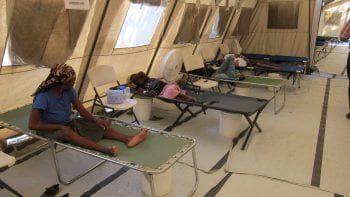CDC at Work: Cholera
For over half a century, CDC has worked to prevent, detect, and respond to cholera outbreaks around the world. CDC has evaluated, adopted, and promoted the most effective measures to combat cholera as new methods have been introduced, from oral rehydration salts to rapid diagnostic tests, and oral cholera vaccines.
In recent years, CDC has helped train experts to prepare for and respond to cholera outbreaks in Cameroon, Ethiopia, Iraq, Kenya, Saudi Arabia, Sierra Leone, South Sudan, Tanzania, Zambia, and Zimbabwe. CDC helped lead the battle against cholera when it struck Haiti in 2010 and CDC recently provided technical assistance and funding to support cholera response efforts in sub-Saharan Africa and Yemen.
CDC is a founding member of the Global Task Force on Cholera Control. CDC experts represent the agency on task force working groups for water, sanitation and hygiene (WASH), case management, epidemiology and surveillance, laboratory, and oral cholera vaccines.
Learn more about CDC’s work to combat cholera in the sections below.
Ending Cholera: The Global Roadmap to 2030

In October 2017, the task force launched Ending Cholera: The Global Roadmap to 2030 – a bold, unified approach to cholera prevention and control. This comprehensive plan integrates evidence-based best practices and identifies priorities to reduce cholera deaths by 90% by 2030.
Implementing the Global Roadmap will protect millions of people from cholera illness and death in endemic settings, and reduce the number, size, and duration of cholera outbreaks. It will also accelerate the effort to reach those most in need with access to safe drinking water and sanitation.
Outbreak Investigations
In Africa and around the world, CDC investigates outbreaks with local governmental and non-governmental partners when they request our scientific and technical expertise. These investigations include risk factor identification for cholera illness and death, and monitoring and evaluating a range of interventions to prevent cholera in these settings:
- Urban and rural communities
- Special settings
- Schools
- Healthcare facilities
- Prisons
- Humanitarian emergencies
- CDC Fights Cholera in Cameroon
- Global Disease Detection and Emergency Response program
Surveillance
Globally, CDC played a leading role in designing, developing, implementing, monitoring, and evaluating the World Health Organization’s (WHO) Integrated Disease Surveillance and Response (IDSR) system. This comprehensive surveillance system is critical in the early detection and response to cholera and other infectious diseases.
State and local health departments work with CDC to conduct surveillance for reportable diseases that occur in the United States. Any case of cholera is reported nationally through CDC and internationally in compliance with WHO’s International Health Regulations.
In Haiti, CDC, along with global partners, continues to provide technical and logistical support to the Ministry of Public Health and Population for the expansion of the national cholera surveillance system.
Health System Reconstruction
In Haiti, CDC worked with the U.S. Agency for International Development, the Pan American Health Organization, the United Nations Children’s Fund, and many other organizations to assist the Haiti Ministry of Public Health and Population and Haiti Directorate of Water and Sanitation in a combined multi-sectoral effort to control the cholera outbreak that began in 2010.
Water, Sanitation, and Hygiene
CDC collaborates with partners to improve water, sanitation and hygiene (WASH) conditions globally to reduce the spread of cholera and other diarrheal diseases. This work has included community level interventions, such as bulk chlorination, and household-level water treatment. CDC has also worked with local governments to create water quality monitoring systems to ensure that households and communities have reliable access to safe water. Our work includes supporting partners to improve hygiene promotion and access to adequate sanitation.
Oral Cholera Vaccines (OCVs)
CDC works closely with task force partners on planning, implementing, monitoring and evaluating oral cholera vaccines. In 2013, a global stockpile was established to ensure that these vaccines are rapidly available for outbreaks and emergencies in cholera hotspots in endemic countries. CDC has also worked with WHO and the Strategic Advisory Group of Experts on Immunization on global policy recommendations for use of these cholera vaccines.